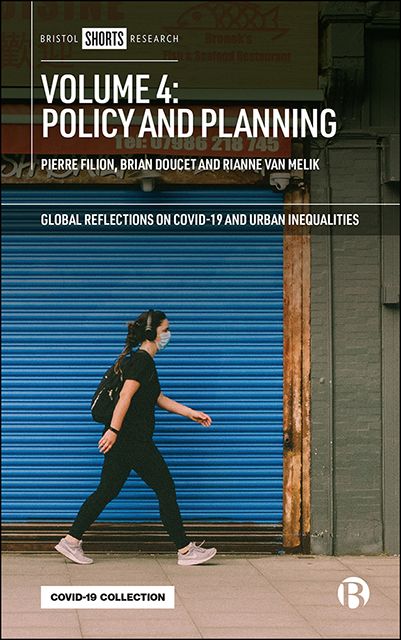Book contents
- Frontmatter
- Contents
- List of Figures and Tables
- Notes on Contributors
- Acknowledgments
- Preface to All Four Volumes of Global Reflections on COVID-19 and Urban Inequalities
- One Introduction: Policy Making in the Face of Uncertainty and Inequality
- Part I COVID-19 and Urban Changes
- Part II The Pandemic, Social Inequality, and Mobilization
- Part III Municipal and Urban Policy Responses
- Index
Twenty - The View from the Socio-Spatial Peripheries: Milan, Italy and Toronto, Canada
Published online by Cambridge University Press: 25 April 2023
- Frontmatter
- Contents
- List of Figures and Tables
- Notes on Contributors
- Acknowledgments
- Preface to All Four Volumes of Global Reflections on COVID-19 and Urban Inequalities
- One Introduction: Policy Making in the Face of Uncertainty and Inequality
- Part I COVID-19 and Urban Changes
- Part II The Pandemic, Social Inequality, and Mobilization
- Part III Municipal and Urban Policy Responses
- Index
Summary
Introduction
At first, the virus causing COVID-19 spread from Wuhan in much the same way as its predecessor, Severe Acute Respiratory Syndrome (SARS), did in 2003: through the network of global industrial and financial centers that define the structure of the world economy. But the trajectory of COVID-19 turned out to be more complex: the new virus proliferates nearly everywhere, including in urban peripheries that have characterized recent urbanization trends. The environments of COVID-19 transmission in the global urban peripheries coalesce into multifaceted and complex geographies characterized by health care system (in)equality, lack of infrastructures, overcrowding, low-wage labor, racism, vulnerability of age/living in an institution, and so on. While posing a major challenge to public health systems around the world, the pandemic has thrown the contemporary challenges for the responses to outbreaks of emerging infectious diseases into sharper view, especially with reference to the accelerated extension of urban processes and forms into regions that had previously not been urbanized. But twelve months into the pandemic, as it has now rolled over most settled regions around the world, places in the global urban world and the spaces between them have generated complex, and often contradictory, outbreak and reopening narratives.
Urbanists have weighed residential density, degrees of informality, transportation modes, housing form, availability of park space, and a host of other factors in determining patterns in the proliferation of COVID-19. Social scientists have pointed to race, class, age, disability, and gender as important determinants. Students of public policy and institutions have pointed to insufficiencies in public health pandemic preparedness and catastrophic negligence in long-term care homes. Labor researchers have highlighted the lack of state regulation and oversight at precarious workplaces such as meatpacking plants, in the agricultural sector, and in long-term care homes. How those factors add up across cities and urban networks specifically will be important to understand as this pandemic continues and as the urban world prepares to face the next, possibly still unknown, contagion that will pose a systemic threat. Put simply, the health crisis due to the COVID-19 pandemic is highly associated with processes of urbanization and globalization but in nonlinear and unpredictable ways.
We follow the virus to the Italian metropolis of Milan and the Canadian urban region of Toronto. Milan was the European epicenter of the first wave, next to the Spanish capital of Madrid.
- Type
- Chapter
- Information
- Volume 4: Policy and Planning , pp. 211 - 222Publisher: Bristol University PressPrint publication year: 2021



